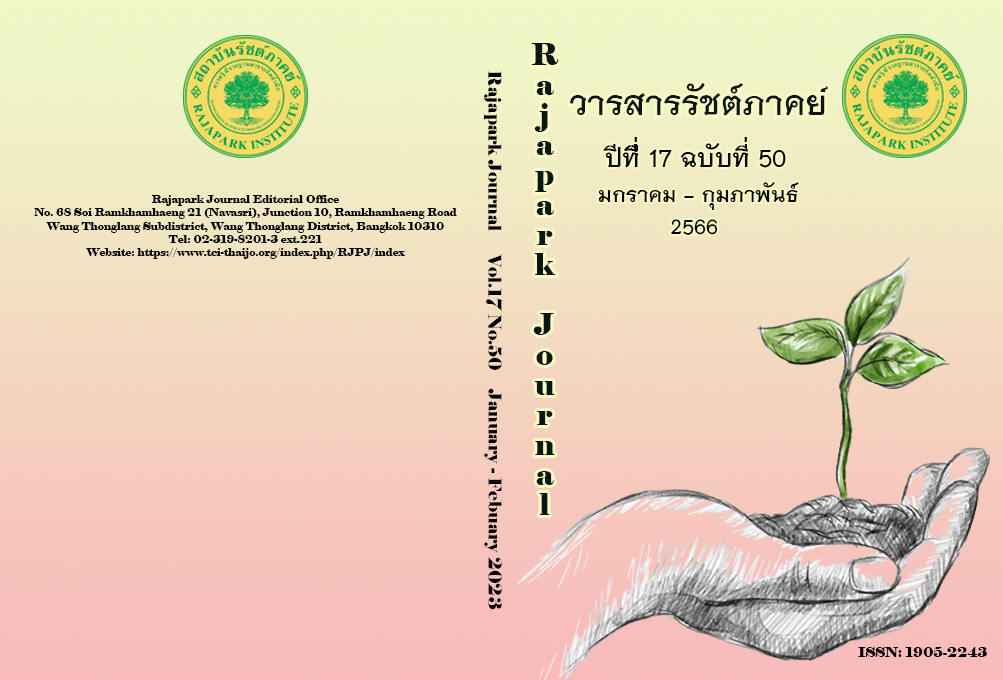The Influence of Job Satisfaction on Organizational Commitment in the Private Sector Employees in Nakhon Ratchasima Province
Main Article Content
Abstract
The purposes of this research were to 1) study personal factors of employees in the private sector in Nakhon Ratchasima Province, 2) study the level of job satisfaction and organizational commitment of employees in the private sector in Nakhon Ratchasima Province, 3) study the influence of job satisfaction on organizational commitment of employees in the private sector in Nakhon Ratchasima province. This research is quantitative. Data were collected from 414 participants who work in the private sector, the sample derived from accidental random sampling. Data were collected through questionnaires and using a computer package program to analyzed the data. The descriptive statistics results were shown in percentage, mean, standard deviation as well as multiple regression analysis. The data revealed that the employees’job satisfaction was at a high level, and the employees’ organizational commitment was at a high level too. The findings of the study indicated that the satisfaction with pay satisfaction, opportunities for promotion, job characteristics, supervisor and coworkers had a significant positive influence on the organizational commitment of employees, Five variables could explain 76 percent of the variance in organizational commitment. From this research finding the entrepreneurs apply the data to develop the organizational strategies for improving employees, job satisfaction, and organizational commitment.
Article Details

This work is licensed under a Creative Commons Attribution-NonCommercial-NoDerivatives 4.0 International License.
Views and opinions appearing in the Journal it is the responsibility of the author of the article, and does not constitute the view and responsibility of the editorial team.
References
Allen, N. J., & Meyer, J. P. (1990). The Measurement and Antecedents of Affective, Continuance and Normative Commitment to the Organization. Journal of Occupational Psychology, 63(1), 1–18. https://doi.org/10.1111/j.2044-8325.1990.tb00506.x
Bashir, B., & Gani, A. (2019). Testing the Effects of Job Satisfaction on Organizational Commitment. Journal of Management Development, 39(4), 525-542.
Chandrangam, L. (2016). The Study of Factors Affecting Organizational Commitment of the Government Savings Bank Head Office Employees in Personal Customer Group[Master’s Thesis, Thammasat University].
Chantapong, S., & Tonghui, T. (2020). The Impact of the COVID-19 Crisis on the Global Economy. Bank of Thailand.
Charutawephonnukoon, P., Wattalo, T., & Sutprasoet, W. (2020). Factors Affect Organizational Commitment of Employees’ SSK Logistics Co., Ltd. Social Science Journal of Prachachuen Research Network, 2(3), 27-39.
Department of Employment. (2017). Strategies for Solving and Preventing Labour Shortages (2017-2021). Department of Employment Ministry of Labour.
Labour Market Information Administration Division. (2018). The Transformation of the Labor Market in the Digital Age. Department of Employment Ministry of Labour.
Leekpai, P. (2020). Organizational Commitment of Government Personnel in Trang Province. Journal of Business Administration and Social Sciences Ramkhamhaeng University, 17(1), 27-54.
Marsh, R. M., & Mannari, H. (1977). Organizational Commitment and Turnover: A Prediction Study. Administrative Science Quarterly, 22(1), 57–75. https://doi.org/10.2307/2391746
Morse, N. C. (1955). Satisfaction in the White Collar Job. University of Michigan.
Muangla, W., & Phuphatthanaphong, K. (2019). Quality of Work in Life Related to the Retention of Employee in Bang Kapi District, Bangkok[Master’s Thesis, Ramkhamhaeng University].
National Statistical Office. (2021). Number of the Formal and Informal Employment by Age Group, Sex, Region and Province: 2012 – 2021. http://statbbi.nso.go.th/staticreport/page/sector/th/02.aspx
Niramon, P., & Anuntachai, N. (2020). The Relationship between Job Satisfaction and Organizational Commitment of Mahanakorn University of Technology’s Employees. MUT Journal of Business Administration, 17(1), 27-54.
O’Reilly, C.A., & Chatman, J. (1986). Organizational Commitment and Psychological Attachment: The Effects of Compliance, Identification and Internalization on Prosocial Behavior. Journal of Applied Psychology, 71(3), 492-499. http://dx.doi.org/10.1037/0021-9010.71.3.492
Pathompongpairoj, R. (2020). The Impact of Job Satisfaction on Organization Commitment in Rojana Industrial Estate 2 in Phra Nakhon Si Ayutthaya Thailand[Master’s Thesis, Vongchavalitkul University].
Rovinelli, R. J., & Hambleton, R. K. (1977). On the use of Content Specialists in the Assessment of Criterion-referenced Test Item Validity. Dutch Journal of Educational Research, 2, 49-60.
Schutz, D.P., & Schutz, S.E. (1994). Psychology and Work Today: An Introduction to Industrial and Organization Psychology. Macmillan.
Smith, P. C., Kendall, L. M., & Hulin, C. L. (1969). The Measurement of Satisfaction in Work and Retirement: A Strategy for the Study of Attitudes. Rand-Mcnally.
Steers, R.M., & Porter, L.W. (1979). Motivation and Work Behavior. McGraw-Hill.
Vanichbuncha, K. (2014). Using SPSS for Windows to Analyze Data (14th ed.). Samlada.
Yamane, T. (1973). Statistics: An Introductory Analysis (3rd ed.). Harper and Row.


